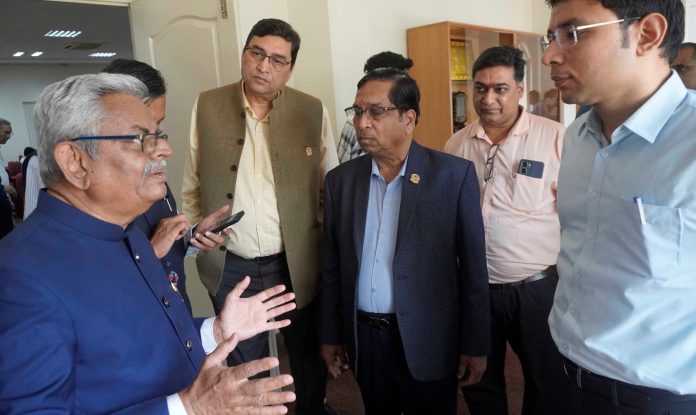Artificial Intelligence is accelerating discovery and opening possibilities for patients with rare diseases and few options, says top T-State official
HYDERABAD, Apr 6 (The CONNECT) – Doctors gave cancer patient Joseph Coates two options: die at home or die in hospital.
Wahington-based Coates who was diagnosed with POEMS syndrome, a rare blood disorder. When doctors gave up hopes, a friend, a professor, suggested an unconventional treatment involving chemotherapy, immunotherapy, and steroids.
The treatment, surprisingly, wasn’t designed by a human—it was generated by an Artificial Intelligence (AI) model. Within a week, Coates showed improvement, and in four months, he was ready for a stem cell transplant.
Narrating this case study, top Telangana Government official Bhavesh Mishra said AI is accelerating discovery and opening possibilities for patients with rare diseases and few options.
POEMS syndrome is a rare blood disorder that damages your nerves and affects other parts of your body, says Mayo Clinic. It stands for:
- Numbness, tingling and weakness in your legs — and over time, maybe in your hands — and difficulty breathing. This is an essential feature in the diagnosis of POEMS syndrome;
- Organomegaly. Enlarged spleen, liver or lymph nodes.
- Endocrinopathy/edema. Abnormal hormone levels that can result in an underactive thyroid (hypothyroidism), diabetes, sexual problems, fatigue, swelling in your limbs, and problems with metabolism and other essential functions.
- Monoclonal-protein. Abnormal bone marrow cells (plasma cells) that produce a protein (monoclonal protein) that can be found in the bloodstream. This is an essential feature in the diagnosis of POEMS syndrome. Monoclonal-protein is often associated with unusual bone hardening or thickening.
- Skin changes. More colour than normal on your skin, red spots, possibly thicker skin, and increased facial or leg hair.
The cause of POEMS syndrome isn’t known, says Mayo Clinic.
Mishra, Deputy Secretary, Information Technology, Electronics, and Communications Department (IT&C), was speaking as the chief guest at a seminar on “Reducing Cancer Mortality – The Role of Technology” organised by the Federation of Telangana Chambers of Commerce and Industry (FTCCI), in collaboration with the Administrative Staff College of India (ASCI) and Swastava Cancer Care (SCC).
“Data science and AI together are powerful,” he said, referring to the concept of ‘serendipity’—accidental discoveries like Streptomycin, Aniline, and Penicillin. He stressed that AI, too, can lead to life-saving discoveries.
He also cautioned about the misuse of AI in medicine and noted that the Government of Telangana is proactively working in this direction, with initiatives like AI4PublicGood, involving industry, academia, and government departments.
Mishra noted that in the early 1950s, even newspapers like The New York Times couldn’t publish the words “breast” or “cancer.” He referred to the Pulitzer Prize-winning book, The Emperor of All Maladies by Dr. Siddhartha Mukherjee, which chronicles the history of cancer and its treatment evolution.
Karuna Gopal, guest of honour, stated that while India allocates 2% of its GDP to healthcare, much of it remains unutilized due to lack of absorption capacity.
Dr. Urvashi Prasad, Patron of Swastava Cancer Care and one of the Most Influential Women in Healthcare (2023–24), delivered a video message. A lung cancer survivor herself, she stressed that technology plays a vital role in reducing cancer mortality. “Aggregate knowledge and apply it. AI can synthesize insights from data, revealing new treatment options,” she said.
R.P. Singh, President of Swastava Cancer Care, former police officer and ex-CEO of Basavatarakam Indo American Cancer Hospital & Research Institute, said, “Our NGO has become a symbol of hope. We are the only NGO in this space using advanced diagnostic tools.”
Dr. Suresh Kumar Singhal, President of FTCCI, revealed startling statistics: “India records more than 15 lakh cancer cases annually, with 9 lakh deaths—a 65% mortality rate, the highest in the world.” He warned that in the near future, every 6th or 7th person may suffer from cancer. “Cancer is not only a health crisis but also a financial burden. Families exhaust their savings, sell jewelry and property to afford treatment.”
Dr. Singhal also raised concerns about food safety. “There are not enough labs to test pesticide levels in our food or the quality of milk,” he noted. He expressed hope that this seminar would highlight how emerging technologies can help reduce cancer mortality, improve outcomes, and make care more accessible and affordable.
Dr. V. Chaturvedi, CEO of Swastava Cancer Care, appealed to Mr. Bhavesh Mishra to support the NGO’s inclusion in the Telangana Social Impact Group (T-SIG), a platform that connects corporate India with government departments and non-profits to optimize resource utilization.




